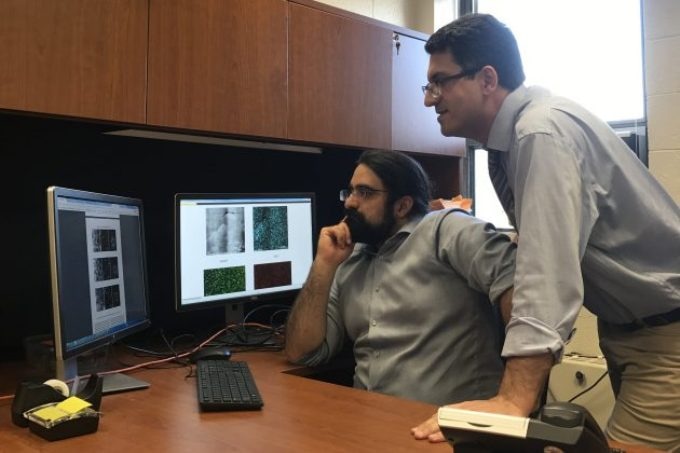Jul 18 2017
 Postdoctoral researcher Peiman Shahbeigi-Roodposhti (standing) and Sina Shahbazmohmadi, assistant professor in biomaterials engineering, discuss grain microstructures characterized by an advanced electron microscope. (Credit: University of Connecticut)
Postdoctoral researcher Peiman Shahbeigi-Roodposhti (standing) and Sina Shahbazmohmadi, assistant professor in biomaterials engineering, discuss grain microstructures characterized by an advanced electron microscope. (Credit: University of Connecticut)
A team of researchers at the University of Connecticut have discovered that decreasing oxygen in certain nanocrystalline materials may enhance their durability and strength at high temperatures, a potential enhancement that could result in faster jet engines, better biosensors, and greater capacity semiconductors.
Stabilizing nanocrystals at elevated temperatures is a common challenge. In certain alloys, we found that high levels of oxygen can lead to a significant reduction in their efficiency.
Peiman Shahbeigi-Roodposhti, Postdoctoral Research Scholar, Institute of Materials Science, UConn
Using a distinct milling process in an enclosed box packed with argon gas, UConn researchers, working in partnership with scientists from North Carolina State University, were successful in synthesizing nano-sized crystals of Iron-Chromium and Iron-Chromium-Hafnium with oxygen levels as low as 0.01%. These almost oxygen-free alloy powders seemed to be a lot more stable than their commercial equivalents with higher oxygen content at high temperatures and under high levels of stress.
In this study, for the first time, optimum oxygen-free nanomaterials were developed. Various characterization techniques, including advanced aberration corrected transmission electron microscopy, revealed a significant improvement in grain size stability at elevated temperatures.
Sina Shahbazmohamadi, Assistant Professor, Biomedical Engineering, UConn
Grain size stability is vital for researchers wanting to develop the next generation of advanced materials. Similar to fine links in a complexly woven mesh, grains are the small solids from which metals are formed. Research has shown that smaller grains are better when it comes to creating tougher and stronger metals that are better conductors of electricity, less susceptible to cracking, and more durable at elevated temperatures and under extreme stress. Latest advances in technology have allowed materials scientists to create grains at the scale of just 10 nm, which is tens of thousands of times smaller than the width of a human hair or the thickness of a sheet of paper. Such nanocrystals can only be observed under very powerful microscopes.
But the process is not flawless. When some nanograins are developed in bulk for applications such as semiconductors, the stability of their size can vacillate under higher stress and temperatures. It was during the examination of this instability that Shahbeigi-Roodposhti and the UConn research team understood the role played by oxygen in weakening the nanocrystals’ stability at elevated temperatures.
This is only a first step, but this line of investigation could ultimately lead to developing faster jet engines, more capacity in semiconductors, and more sensitivity in biosensors.
Sina Shahbazmohamadi, Assistant Professor, Biomedical Engineering, UConn
In the days to come, the UConn researchers will be testing their theory on other alloys to check whether the presence or absence of oxygen influences their performance at high temperatures.
The study, “Effect of oxygen content on thermal stability of grain size for nanocrystalline Fe10Cr and Fe14Cr4Hf alloy powders,” which was supported by funding from the U.S. Department of Energy, presently appears online in the Journal of Alloys and Compounds.
Other co-authors on the paper were Mostafa Saber, an assistant professor at Portland State University; and Professors Ronald Scattergood and Carl Koch from North Carolina State University. DOE funding supporting the research was acquired by Scattergood’s lab.